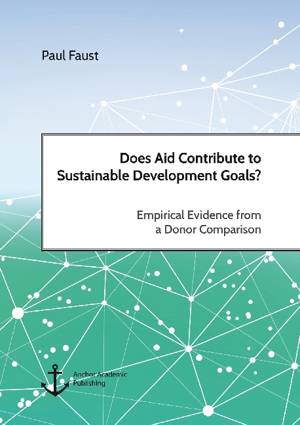
- Retrait gratuit dans votre magasin Club
- 7.000.000 titres dans notre catalogue
- Payer en toute sécurité
- Toujours un magasin près de chez vous
- Retrait gratuit dans votre magasin Club
- 7.000.0000 titres dans notre catalogue
- Payer en toute sécurité
- Toujours un magasin près de chez vous
Does Aid Contribute to Sustainable Development Goals? Empirical Evidence from a Donor Comparison
Paul Faust
Livre broché | Anglais
39,45 €
+ 78 points
Description
No Poverty, Zero Hunger, Good Health, Well-being and Quality Education - these are the first priorities of the Sustainable Development Goals (SDGs) that were launched jointly by all UN Member States on January 1, 2016. The agenda of this agreement contains 17 main goals with a total of 169 targets and is dedicated to improving global living conditions and to address issues of environmental and economical sustainability with a planning horizon through to 2030. Development assistance from economically advanced countries, also referred to as aid, is one of the major means to provide financing for countries with less developed economies that face severe social problems, and which often cannot handle these problems alone. Previous studies have shown, however, that aid is ineffective and recommend comprehensive restructuring of the common aid practices. Investigations that analyse the pattern of aid flows find, moreover, that granting aid to certain recipient countries cannot only be explained by altruistic motives. They show that several strategic or non-strategic reasons have a high explanatory power for individual donor aid allocation. Against this background, the present study explores aid effectiveness of distinct bilateral donors. This is achieved by a large-scale panel data analysis applying per-capita economic growth, infant mortality and primary growth as indicators for measuring the contribution of aid to achieving the different SDGs.
Spécifications
Parties prenantes
- Auteur(s) :
- Editeur:
Contenu
- Nombre de pages :
- 98
- Langue:
- Anglais
Caractéristiques
- EAN:
- 9783960672166
- Date de parution :
- 09-01-18
- Format:
- Livre broché
- Format numérique:
- Trade paperback (VS)
- Dimensions :
- 178 mm x 254 mm
- Poids :
- 185 g

Les avis
Nous publions uniquement les avis qui respectent les conditions requises. Consultez nos conditions pour les avis.






